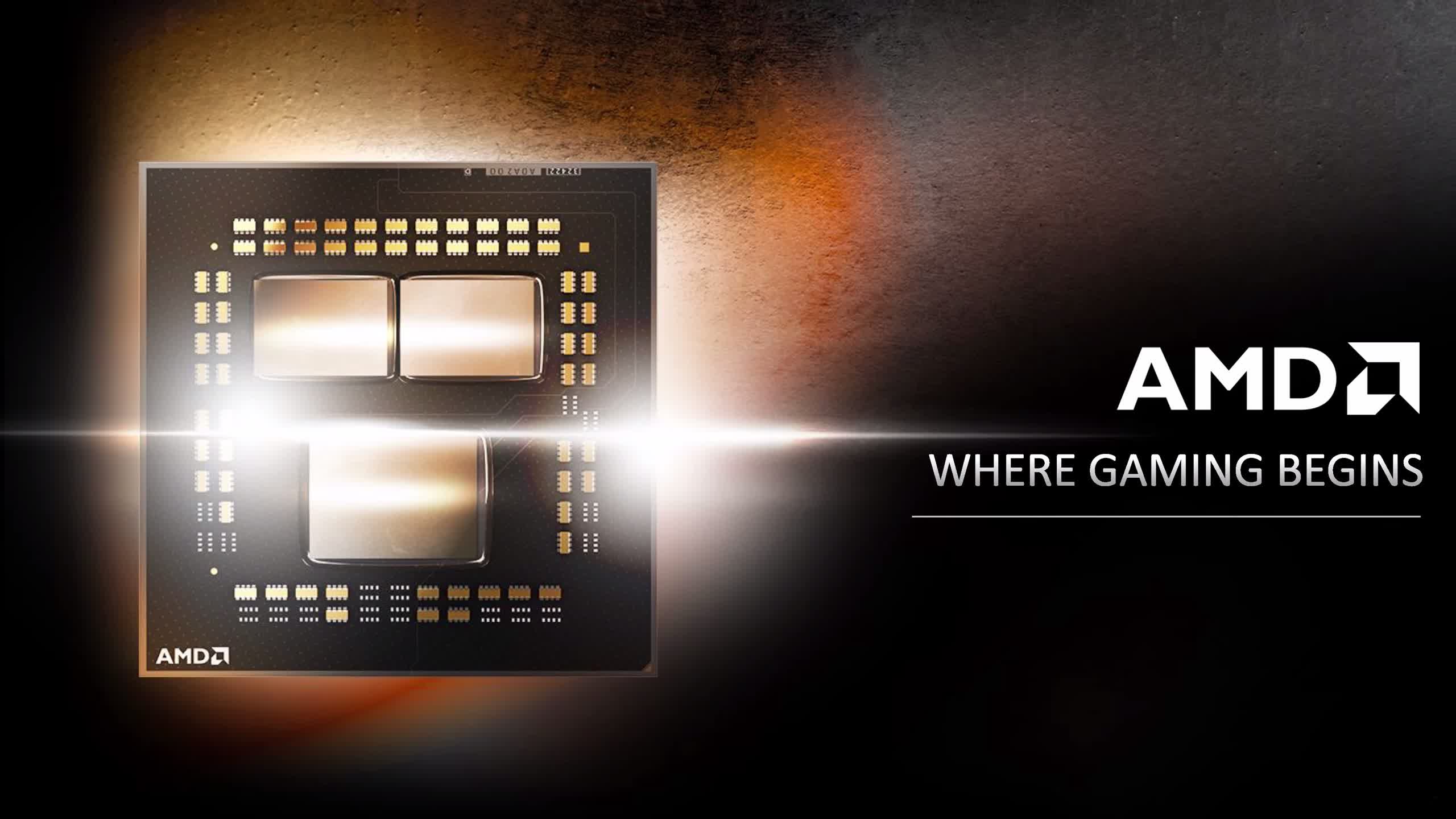
AMD CEO, Lisa Su unveiled the company's Zen 3 architecture today in the form of new Ryzen 5000 series desktop processors. First of all, yes, this is the Ryzen 5000 series. AMD has branded the lineup in this way to avoid any confusion with existing Ryzen 4000 parts. AMD's had this weird split for a while where Zen 2 on mobile has been Ryzen 4000, while desktop parts were the 3000 series. That ends today with the Ryzen 5000 series which is all Zen 3 moving forward.
AMD announced four new processors, all of which will be available on November 5. The Ryzen 9 5900X brings a 12 core, 24 thread design with a 4.8 GHz boost clock, 70 MB of cache split into 64 MB L3 and 6 MB L2, along with a 105 W TDP. It'll be available for $549.
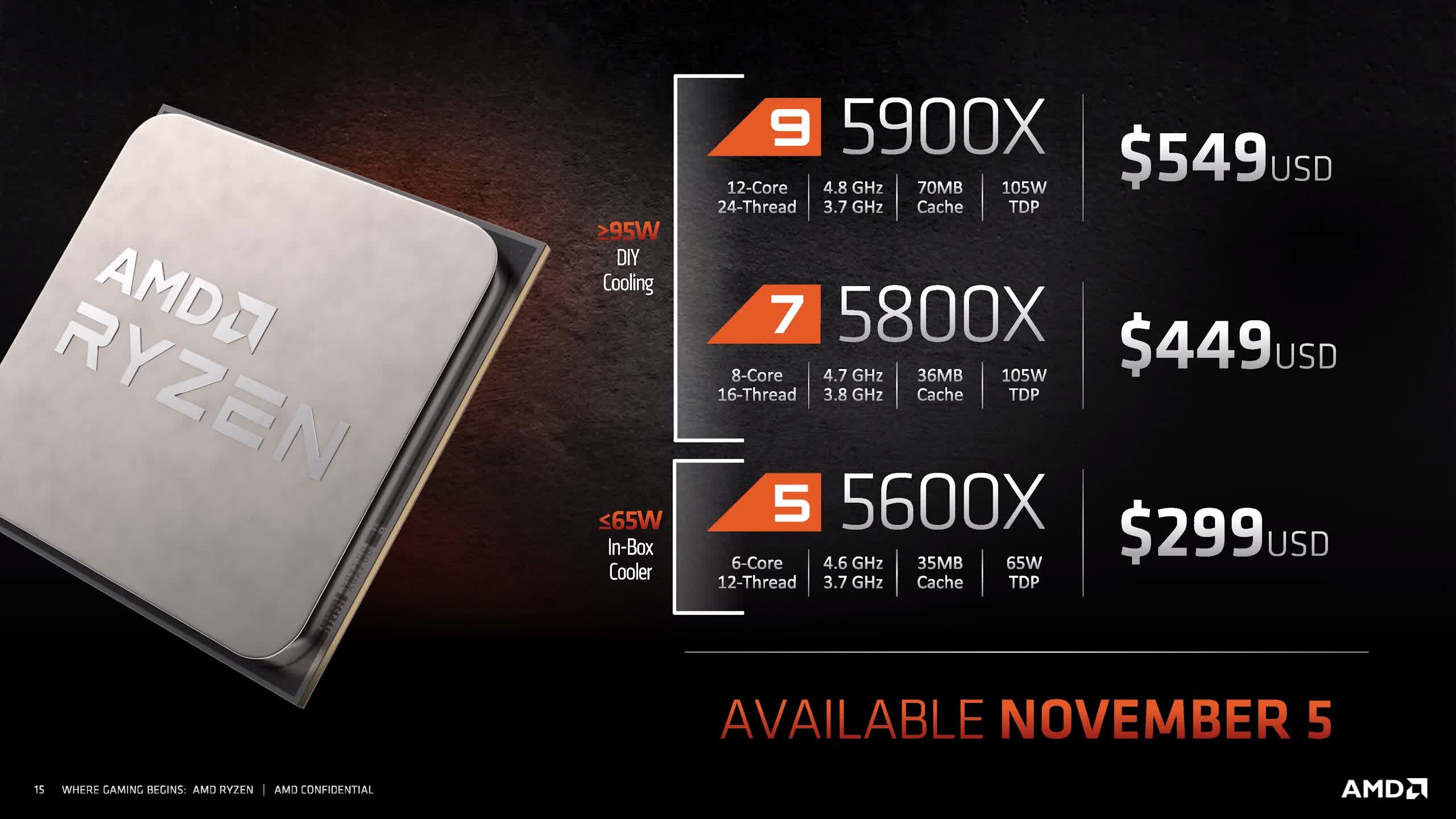
Next up is the Ryzen 7 5800X, an 8 core 16 thread part with a 4.7 GHz boost clock, 32 MB of L3 cache and 105 watt TDP for $449, and then we have the Ryzen 5 5600X which at $299 brings 6 cores, 12 threads, a 4.6 GHz boost clock, 32 MB of L3 cache and a 65 watt TDP.
At the top of the stack is the Ryzen 9 5950X: 16 cores, 32 threads, with a boost clock up to 4.9 GHz, 72 MB of L3 + L2 cache, and a 105 watt TDP, priced at $800 with the same November 5 launch date.
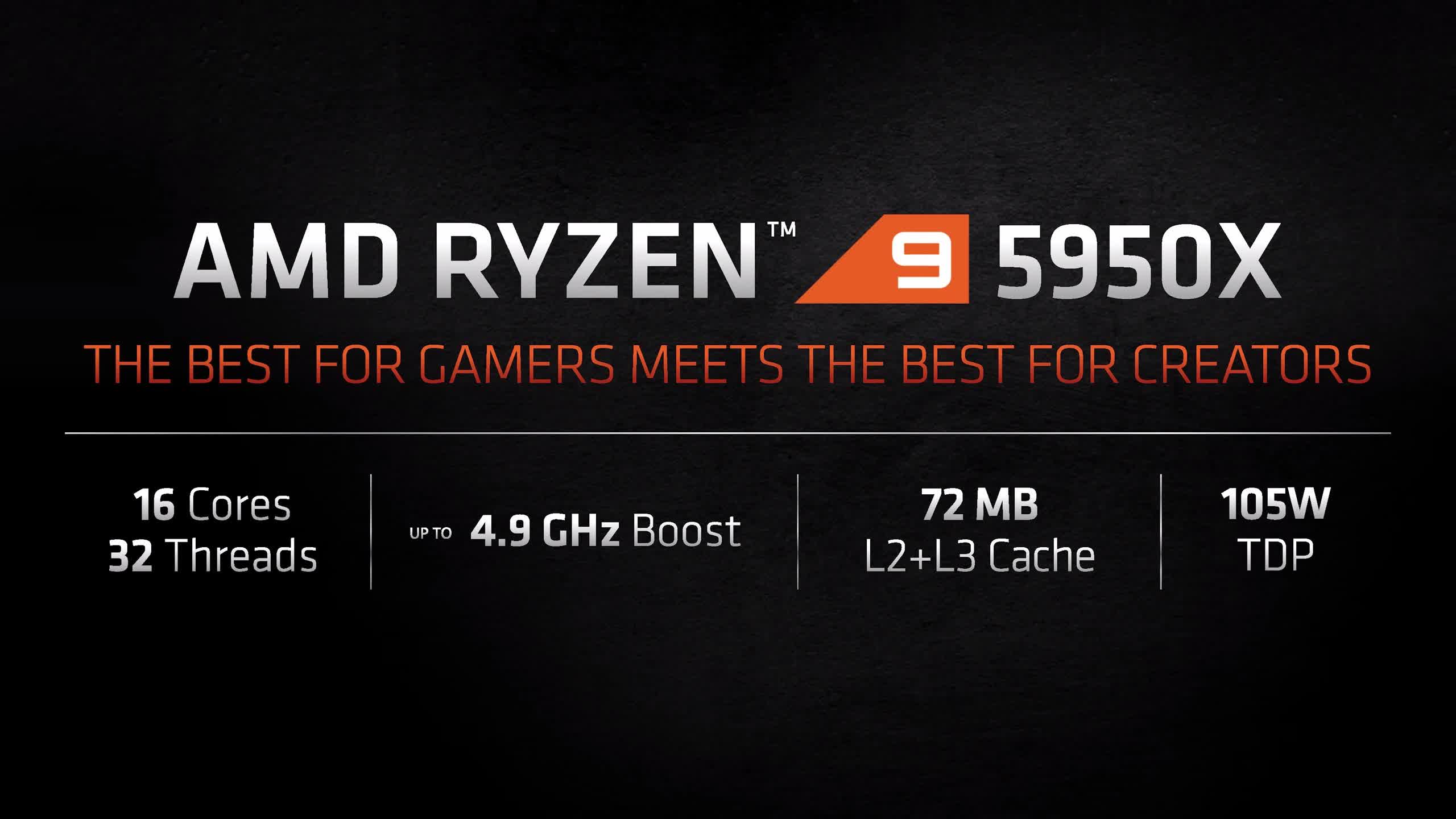
AMD has kept the same core count configuration as its predecessors. We're also getting the same amount of cache in each chip, and the same TDP, with AMD explicitly mentioning to us the power consumption will be the same between Zen 2 and Zen 3-based chips, presumably of the same core count.

One aspect of the Ryzen 5000 series that we can see from these specs is the higher frequency AMD is able to hit. Previously for the X series, AMD were hitting 4.4, 4.5, 4.6, and 4.7 GHz from the six core through to 16 core parts, then with the XT models we got a small bump up to 4.5, 4.7, and 4.7 GHz for six through 12 core designs.
With Zen 3, AMD is hitting slightly higher clocks, from 100 to 200 MHz higher, which is a modest gain, however AMD is achieving this with no changes to the process node. New Ryzen 5000 chips are still using TSMC's 7nm manufacturing node.
The bigger news surrounding Zen 3 are the changes AMD has made to the core design. The company says this is an all-new design with a bigger jump than we got from Zen to Zen 2. Every area was looked over when trying to improve performance. One major change is a shift in the way the CCX modules work...
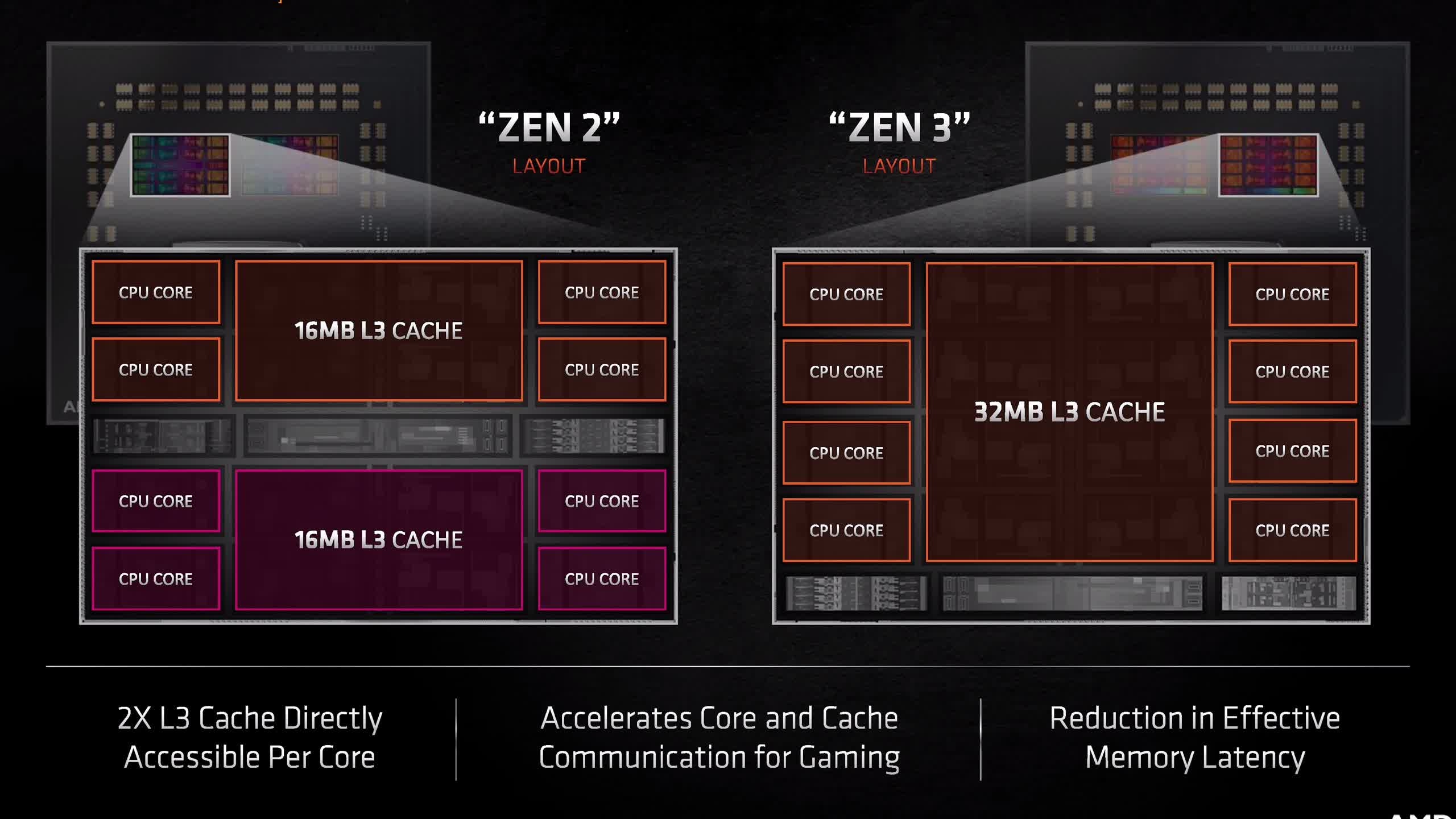
Zen 2 chiplets which featured eight cores were split into two four core CCX's each with 16 MB of L3 cache. Zen 3 unifies the design meaning each 8-core triplet has a single CCX with unified access to all 32 MB of L3 cache. AMD says this reduces latency for both the cores and memory significantly, which helps gaming performance. AMD says there's a 19% average IPC improvement for Zen 3 versus Zen 2.
AMD is also claiming higher performance per watt for Zen 3 versus Zen 2, at 2.4 times that of first-generation Zen. AMD will also proudly tell you it's 2.8 times more efficient than the Core i9-10900K, which is no surprise given Intel remains stuck on 14 nm with a Skylake-era architecture.
All connectivity in Zen 3 remains the same as before, so the same configuration of PCIe 4.0 lanes and the same memory support which remains at DDR4-3200 as a base spec, with up to DDR4-3733 getting a one-to-one ratio. With the Infinity Fabric, we were told that everything you know about Zen 2's memory applies to Zen 3, so the same recommendations for memory kits will apply.
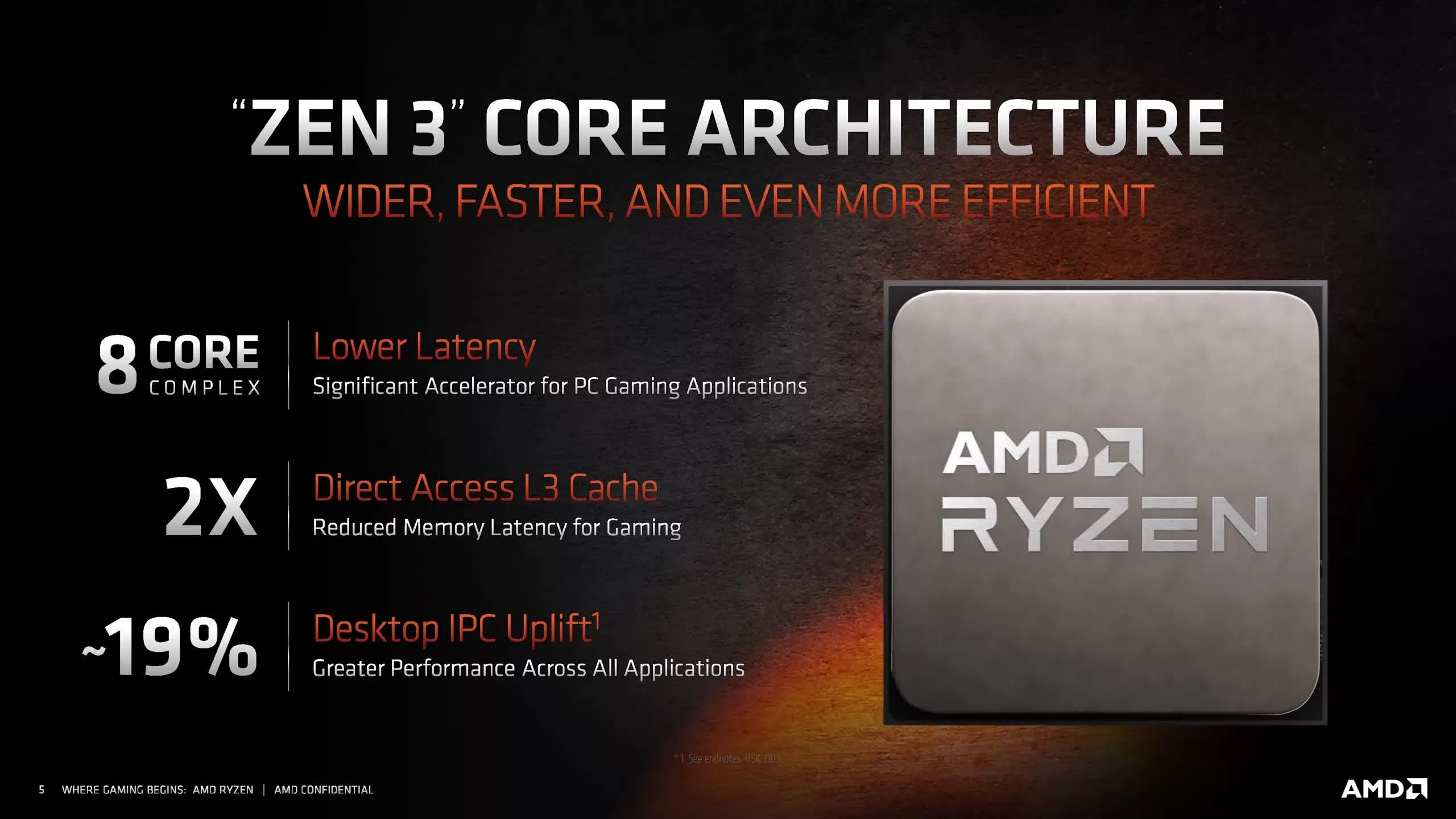
You will also have spotted that all Ryzen 5000 models are more expensive than previous generations. Each product has received a $50 price increase, so for example where the Ryzen 7 3800X used to cost $400 at launch, the Ryzen 7 5800X will now cost $450. We don't think the price hike is unreasonable, and we’ve seen how CPU prices go down over time (sometimes faster in one generation than other), which does mean that at least for the short term, the newer processors will be more expensive than the ones they’re replacing by a wider margin.
We're also not seeing any “non-X” parts at launch. Zen 2 launched with the 3700X and 3600 as more affordable, lower clocked variants of the 3800X and 3600X, but that isn't happening this time around. We think the door might still be open for lower-cost Zen 3 parts, but we're not getting them at launch.
AMD did spend almost the entire presentation talking about gaming performance, and it's clear that this generation is when AMD expects to take the throne for not just productivity performance, but 1080p gaming as well. Benchmarks from the company itself should always be taken with a grain of salt, so keep that in mind as we go through some of these, but AMD is making some bold statements.
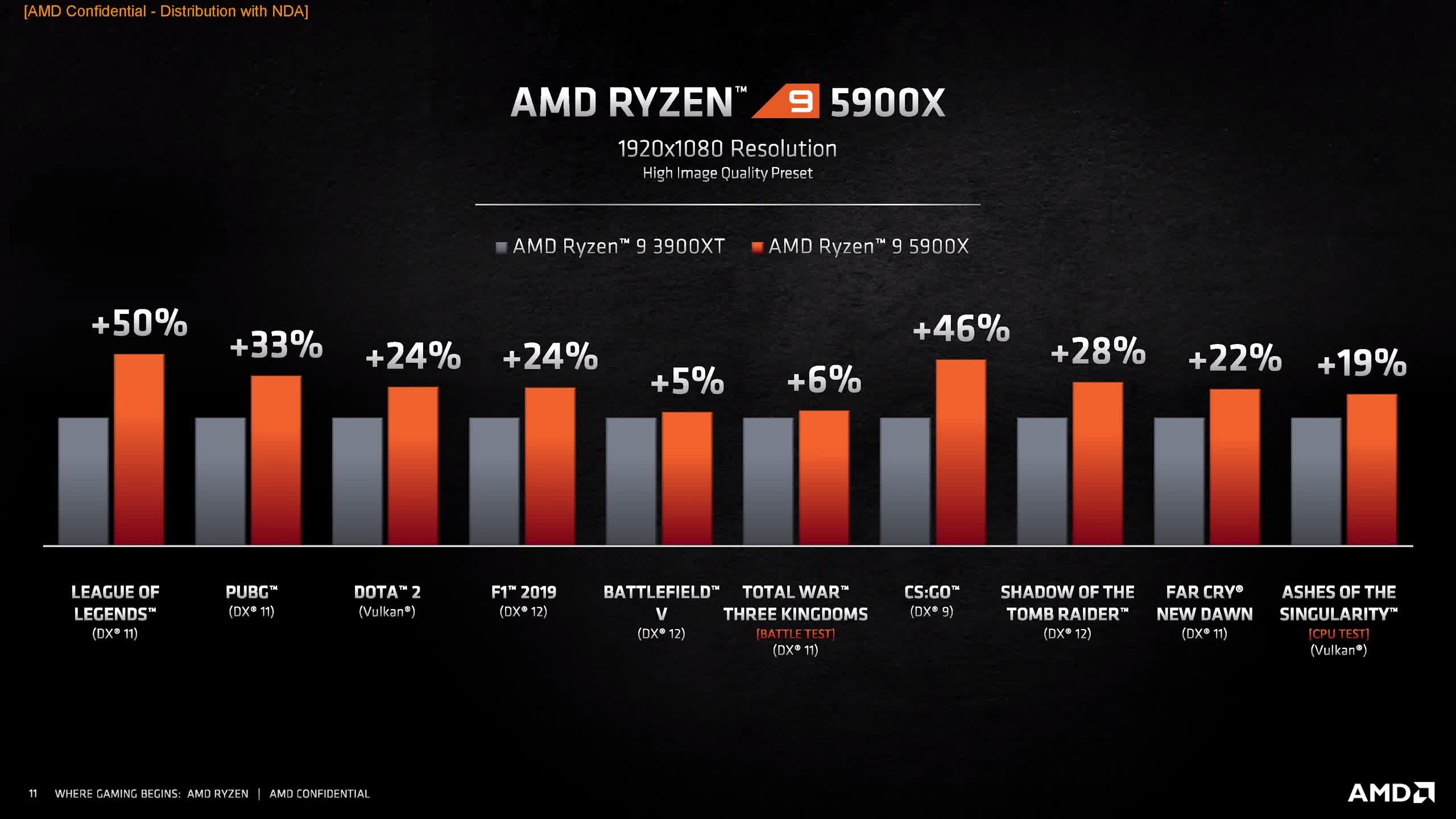
In Cinebench R20 single thread, AMD is claiming the Ryzen 9 5900X will hit a score of 631 making it the first desktop processor to hit the 600-point mark. That's with the IPC improvements and the slight clock speed jump to 4.8 GHz turbo. Previously, AMD would get around 530 in this benchmark with the 3950X, which means we could be seeing a 100-point or 19% performance improvement, which is right on what AMD has said should be the average IPC gain. Intel’s Core i9-10900K in our testing scored 551, so this would make the 5900X 15% faster.
AMD is claiming Ryzen 5000 is the fastest CPU on the market in their performance charts, which were tested at 1080p high settings using an RTX 2080 Ti and DDR4-3600 memory for all configurations including Intel’s.
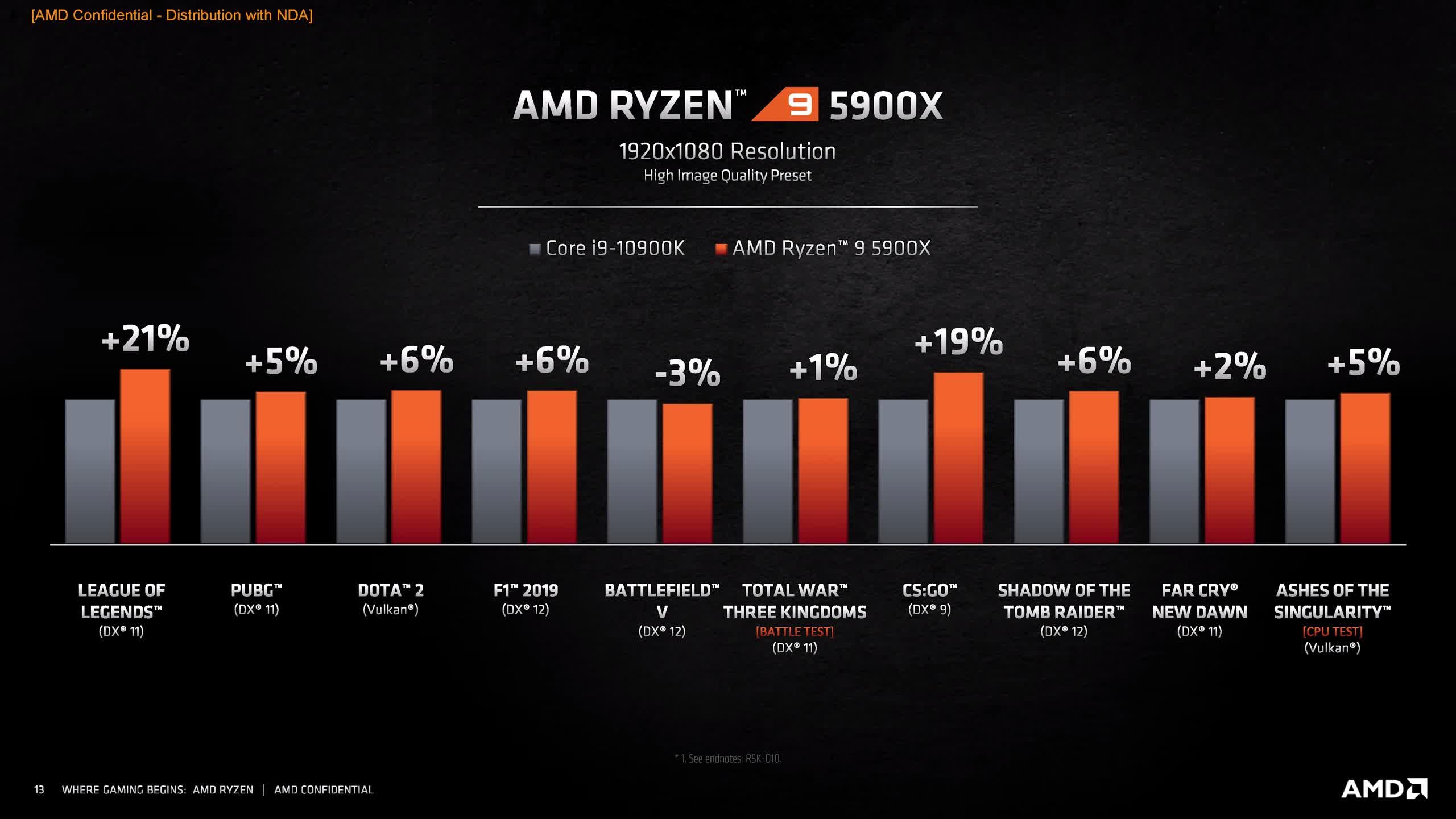
The Ryzen 9 5900x was up to 25% faster in many CPU-limited titles than the Ryzen 9 3900 XT, and some gains were up to 50 percent higher like in League of Legends, and CS GO, according to AMD's numbers.
When compared to the competition, AMD expects to beat the i9-10900k in most games. What's most impressive here is that in games where AMD has struggled in the past like Far Cry New Dawn, AMD is now claiming a performance lead.
In our benchmarking, the 10900K was 18% faster than the 3950X in Far Cry, but now AMD says it's 2 percent ahead of Intel, which is a very minor lead, but given where AMD is coming from, it makes it a little more impressive and will put AMD in the conversation for those that want the "best of the best" gaming CPU.

In other titles AMD is typically claiming a ~5% lead on Intel's best gaming processor. AMD told us that they don't expect to beat Intel in every game, but that they should come pretty close and on occasion the wins can be significant. Of course, we'll have to see where AMD ends up in our benchmark suite, but with this generation AMD has gone from claiming they are in contention to being possibly the fastest.
AMD also states they have the fastest processor for single-thread heavy productivity workloads like Solidworks. When comparing the R9 5950X to the 10900K, AMD showed a six percent lead assisted by a 27 percent gain in performance over their previous generation flagship.
In the end, we'll have to wait for independent benchmarks to judge the value proposition that AMD is showing. Like all company-produced benchmarks, we suspect there has been some level of cherry-picking. To what extent, we'll have to wait until reviews come out.
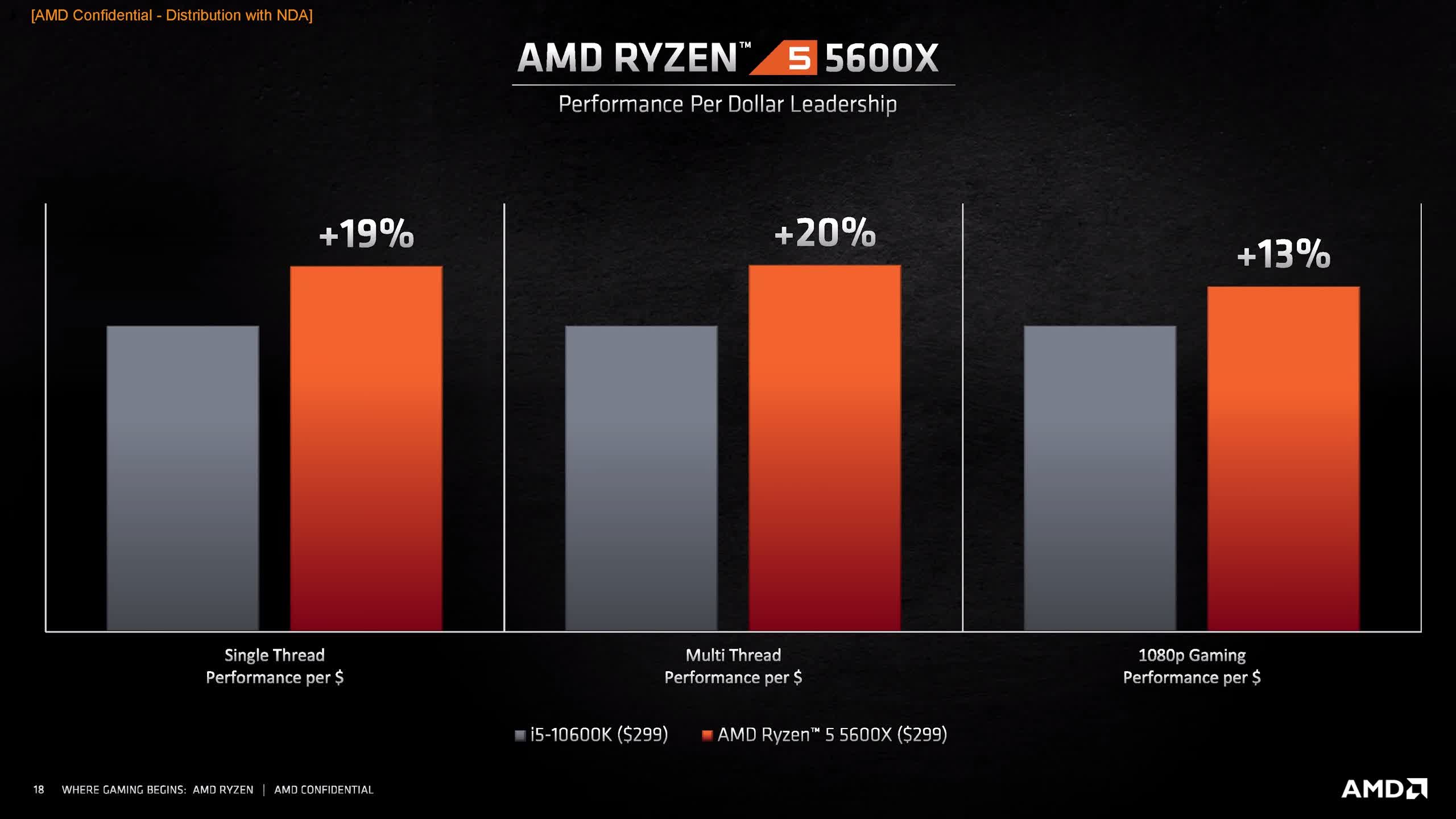
AMD seems to have learned from rocky platform launches of previous Zen CPUs, because this time around they’re being more straightforward if you are planning to upgrade to a new CPU. Support for Ryzen 5000 with 500 series motherboards will come in two stages. Available already is initial support for Zen 3 on existing motherboards. Any BIOS update on these boards that includes AGESA 1.0.8.0 code or newer will be able to post and boot into a system with a Zen 3 processor installed.
AMD then says for the best Zen 3 experience there will be another BIOS update to AGESA 1.1.0.0 around launch on November 5. It seems that some boards have already received this code and have released updates, but it's expected most 500 series boards will have the update ready by launch. As for 400-series motherboards, B450 and X470, AMD is expecting better BIOS for these boards to be available starting January 2021.
As far as we know, there won't be a 600 series of motherboards anytime soon. It's all about 500 and 400 series for this launch. After seeing what AMD has in store with Zen 3, we think it's important to note just how crucial 400 series motherboard support is with this generation.
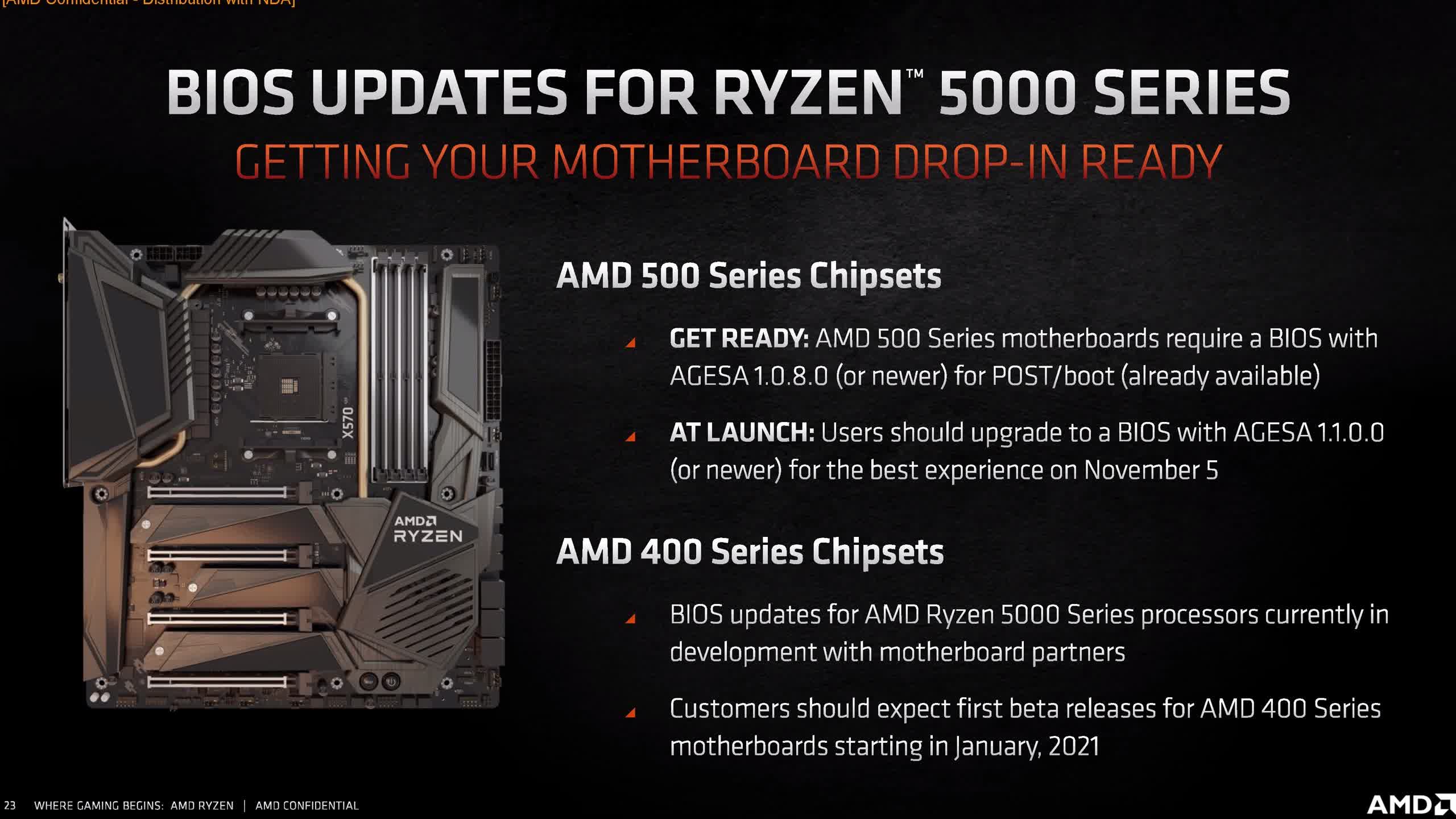
Finally, we got a very brief look at performance for an upcoming “unnamed” Radeon RX 6000 series GPU. The graphics card was shown off playing a game paired with a Ryzen 5000 CPU and we also got only a handful of benchmark figures.
Shown below is Borderlands 3, Call of Duty: Modern Warfare, and Gears of War 5 played at 4K using maximum quality settings. All games were playable at 60+ fps. We don't know whether this is the highest-end part in AMD’s lineup, but the product shown is producing performance around the mark of Nvidia’s GeForce RTX 3080.
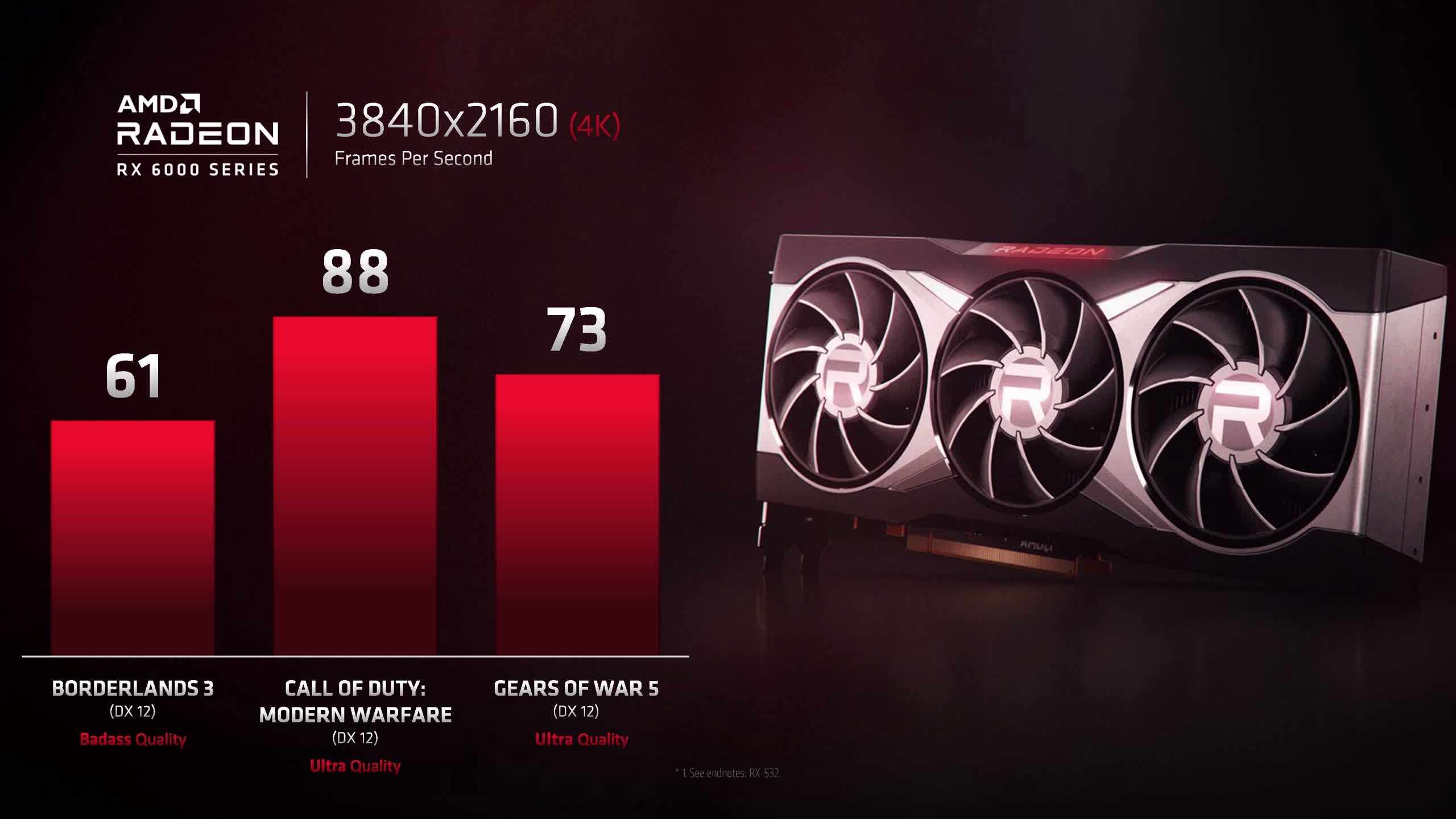
We'll learn more about the Radeon RX 6000 series at AMD's October 28 event, but we guess a little bit of a teaser won’t hurt anyone.
That's it for AMD's Zen 3 announcement, and now we'll just have to wait until we get these chips on hand and benchmark them. You can expect reviews to go live around that November 5 launch date, which is nearly a month away. Stay tuned.
https://www.techspot.com/news/87037-amd-ryzen-5000-launch-fastest-gaming-cpu-higher.html